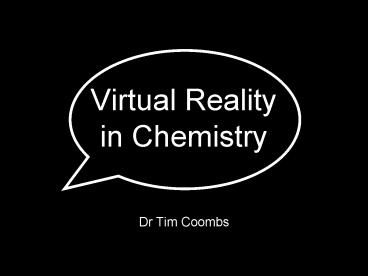Virtual Reality in Chemistry - PowerPoint PPT Presentation
Title:
Virtual Reality in Chemistry
Description:
James Watson, 'The Double Helix' Crick and Watson. So, why ... Watson, J. (1970) The Double Helix: a personal account of the discovery of the structure of DNA. ... – PowerPoint PPT presentation
Number of Views:47
Avg rating:3.0/5.0
Title: Virtual Reality in Chemistry
1
Virtual Reality in Chemistry
- Dr Tim Coombs
2
A short science lesson(you lucky people!)
3
Mystery Object
4
(No Transcript)
5
Any better?
6
In place of pencil and paper, the main working
tools were a set of molecular models resembling
the toys of preschool children. - James Watson,
The Double Helix
7
Crick and Watson
8
So, why use VR?
9
80 µm
10
Science Space
- Joint venture between George Mason University,
University of Houston and NASA. - 3 VR worlds set up to teach and explore different
areas of science. - Newton World (kinetics and dynamics).
- Maxwell World (electrostatics)
- Pauling World (chemistry)
- http//www.virtual.gmu.edu/
11
Pauling World
12
Evaluation - VR vs. 2D
- Maxwell World evaluated against EMF.
- Students tested post-lesson and 5 months later
- Results -Concepts - higher in VR post lesson,
similar 5 months later.2-D understanding -
similar for VR and EMF in both instances.3-D
understanding - higher for VR in both instances.
13
Exploring using CAVE
- CAVE Cave Automatic Virtual Environment.
- Allows scientist to explore how molecules
interact. - Simulation can be stopped at any point for
further exploration. - Gives new perspective and appreciation of
molecules.
CAVE at Argonne National Laboratory
14
New drug treatments
- Used to develop new treatments for Chagas
disease. - Current drugs kill parasites but are toxic to
humans. - Using CAVE researchers modified existing drugs
and looked at the effects.
15
Modelling Proteins
16
Examining HIV
17
Sculpt
- Run using standard computer hardware.
- Much more accessible than CAVE based simulations.
- Users pull molecules about to see how they
interact. - The whole molecule is continually reshaped to
lowest energy configuration.
18
Conclusions
- Virtual reality is a useful tool for modelling
things that are too small to be seen. - Scientists can use VR to get more of a feel of
how molecules interact. - Useful as a teaching tool.
- Ultimately VR can be used to advance scientific
knowledge that would be able to improve our lives
and hence augment reality. - Limitation - Quantum Mechanics!!
19
References
Argonne National Laboratory Website
http//www.anl.gov/ Cruz-Neira, C., Sandin, D.
J. and DeFanti, T. A. (1993) Proc. SIGGRAPH 93,
ACM New York, pp. 135. Disz, T., Papka, M.,
Pellegrino, M., Stevens, R. and Taylor, V. Proc.
(1995) 1995 Simulation Multiconference Symposium,
Society for Computer Simulation Phoenix 1995,
pp. 483. Ihnlenfeldt, W-D. (1997) Virtual
Reality in Chemistry. Journal of Molecular
Modeling, 3, 386-402. Lent, G. E., Rowlan, J.,
Bash, P. and Cruz-Neira, C. (1994) 223. SIGGRAPH
Visual Proceedings, Computer Graphics Annual
Conference Series, pp. 223. Salzman, M.C., Dede,
C., Bowen Loftin, R. (1996) The development of a
virtual world for learning Newtonian mechanics.
Multimedia, Hypermedia and Virtual Reality, 1077,
87-106 Salzman, M.C., Dede, C., Bowen Loftin,
R., Chen, J. (1999) A model for understanding how
virtual reality aids complex conceptual learning.
Presence Teleoperators and Virtual Environments,
8 (3), 293-316 Surles, M., Richardson, J.,
Richardson, D., Brooks, F. (1994) Sculpting
proteins interactively Continual energy
minimization embedded in a graphical modeling
system. Protein Science, 3, 198. Watson, J.
(1970) The Double Helix a personal account of
the discovery of the structure of DNA.
Harmondsworth Penguin Wood, F. Brown, D.,
Amidon, R. A., Alferness, J., Joseph, B.,
Gillilan, R. E. and Faerman, C. (1996) WorkSpace
and the study of Chagas' disease. IEEE Computer
Graphics and Applications, 16, (4) 72-78































